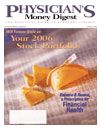Publication
Article
Physician's Money Digest
Combat the Challenges to Preserving Wealth
Most physicians believe that attaining, notmaintaining, wealth is the challenge, butthis is not necessarily true. Once you haveattained a certain level of assets, investing mismanagement,illness and health care costs, liability andlawsuits, and economic and capital market risks canchallenge your financial independence. That's whyit's so important to create a strategy to combat thesechallenges and preserve your wealth.
•Investing mismanagement. Guarding againstinvestment mismanagement requires constant vigilance.It's important to calculate your net worth regularlywhile watching for signs of decline. Additionally,evaluate your portfolio habitually to ensureyou have a diverse mix, including investments thatreact differently to market conditions. Don't investtoo heavily in one area, and avoid extremely largebalances in uninsured cash accounts like moneymarket funds. A financial planner can help guideyour portfolio, but commit only after ample research.Ask potential service providers about theirspecialties and capabilities, approach to serving similarclients, and fee structure.
•Illness and health care costs. What if youwere unable to work because of an illness? Wouldyour disability insurance cover your family's expenses?If your policy doesn't test well, consider an own-occupationpolicy, which generally provides strongercoverage. Further, review opportunities with associationsand societies that enable you to obtain healthcare gap coverage.
•Liability and lawsuits. Consult with an advisorto assess your options to protect your practiceand your personal life. Not every insurance providerhas the same structure, financial strength and performance,or coverage options. In addition, maintainappropriate levels of liability coverage under yourautomobile and homeowners insurance, giving specialconsideration to recreational vehicles. Anumbrella liability policy that supplements coverage inamounts from $1 million to $5 million can be purchasedinexpensively.
•Economic and capital market risks. To protectyour assets in the event of a US economic downturn,invest across a broad range of asset classes andinclude international stocks and bonds. Maintain aportion of your investments in high-quality debtinstruments such as US Treasury securities, government-backed bonds, or corporate or municipalbonds, which provide a hedge against credit collapse.One way to hedge inflation risks is by includingTreasury Inflation Protected Securities, andreduce portfolio volatility with a hedge fund offunds, which can provide positive returns in eitherbull or bear stock markets. In addition, a moderateinvestment in precious metals or other hard assetscan make sense in a diversified portfolio, althoughthey can significantly underperform bonds andstocks for extended periods.
Talk to your financial planner to begin mappingan asset protection strategy to guard against yourbiggest risks to financial independence. It is importantnot to put off this process.
, provides comprehensive investment
consulting, estate planning, financial planning, and income tax
planning services to high-net-worth individuals, foundations, and
endowments. He also provides consulting services specific to
physicians and physician-based professional groups. He welcomes
your comments and questions at 248-223-3574 or kevin.kral@plante
moran.com. Timothy Wendt, CFP®, provides high-net-worth individuals, particularly
physicians, with a wide range of services including retirement planning, asset
allocation, investment policy, and investment consulting. He welcomes your questions
and comments at 269-567-4621 or timothy.wendt@plantemoran.com.
Kevin T. Kral, CPA/PFS, CFP®
